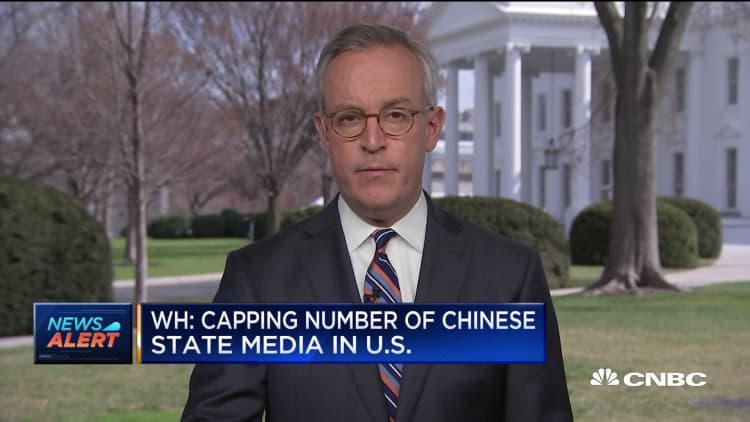The Trump administration on Monday said it is imposing a cap on "the number of Chinese citizens permitted to work" for China's major state-run media companies in the U.S. "at any given time."
"Today, we announced a personnel cap on Chinese government-controlled media organizations in the United States," Secretary of State Mike Pompeo said in a tweet Monday. "We urge Beijing to respect freedom of expression and will continue to seek reciprocity across the bilateral relationship."
The cap comes weeks after China revoked the press credentials of three Wall Street Journal reporters based in Beijing, a move that sparked fury from White House officials.
The reporters were expelled after outrage in China over an opinion piece printed in the Journal whose headline referred to China as "the real sick man of Asia," Chinese Foreign Ministry spokesman Geng Shuang said during a news briefing on Feb. 19.

The move marked the first time since the era of Mao Zedong that China has expelled multiple journalists from one international news organization simultaneously, according to the Journal.
"Our goal is reciprocity. As we have done in other areas of the U.S.-China relationship, we seek to establish a long-overdue level playing field," Pompeo said in a statement to CNBC about the cap. "It is our hope that this action will spur Beijing to adopt a more fair and reciprocal approach to U.S. and other foreign press in China."
"We urge the Chinese government to immediately uphold its international commitments to respect freedom of expression, including for members of the press," Pompeo added.
The State Department cap will cut the number of Chinese nationals working for the state-run media companies in the United States to 100 employees down from 160, according to the Wall Street Journal.
A State Department spokesperson told CNBC that the cap extends to five Chinese media entities: Xinhua News Agency, China Global Television Network, China Radio International, China Daily Distribution Corporation and Hai Tian Development USA.
Last month, the Chinese outlets were designated as foreign missions by the White House, meaning that none of the outlets will be regarded as an independent news organization in the country.
The move to impose a cap may escalate already-existing tensions between the United States and China, which come as the deadly coronavirus outbreak continues to spread globally.
China seemed unhappy with the move, according to a Foreign Ministry spokesperson who questioned the validity of the White House's goal of "reciprocity."
"Now the US kicked off the game, let's play," she wrote on Twitter early Tuesday.
— CNBC's Amanda Macias and Kevin Breuninger contributed to this report.


